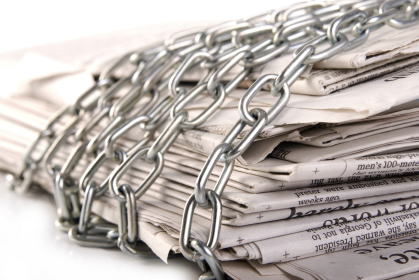Sweden, Norway and Finland tied for top spot in the results, which were released this spring. From the fact that each had accumulated 10 points one could deduct that absolute press freedom exists nowhere – at least according to Freedom House.
The top three were followed by Belgium in fourth with 11 points, then Denmark, Luxembourg and the Netherlands in places 5-8 with 12 points each. At ninth spot was Andorra with 13 points and sharing the 10-11 places were Iceland and Lichtenstein with 14 points.
One must note that Estonia, after spending 50 years with a totally ideologically controlled media has been able to gain its rightful position amongst a group of countries considered to have a lengthy tradition of a free press. A comparison with its Baltic neighbours is starkly telling. Lithuania was given 23 points and tied with Dominica and Suriname for the 40-42 spots and Latvia, scored 27 points, was equal with Cabo Verde, Kiribati and Papua New Guinea, placing it in the 54-57 spots.
Countries considered to have no press freedom were Russia, Azerbaijan and Zimbabwe given 80 points and placed in the 172-174 spots. At the very bottom of the list were Uzbekistan, Turkmenistan and North Korea, in that order.
In Estonia, press freedom is constitutionally protected. More important, the government respects that and the populace expects it. This principle is rooted as part of the native culture. Estonia is home to numerous media outlets operating throughout the country. The independent media vigorously expresses many different viewpoints and government doesn't interfere. Unrestricted access to the internet is allowed. Libel is not a criminal offence. The Public Information Act (similar to access to information legislation in Canada) obliges the Estonian officials to assist the public in accessing governmental documents and this must done without charge. After much debate, a law was passed in 2010 allowing journalists to be prosecuted for refusing to disclose sources, but this only applies in the investigation of the most serious crimes. For the Russian speaking population all media outlets, both domestic and foreign are available, with no restrictions on those consistently carrying anti-Estonian content and/or blatant fabrications.
The situation in Russia is unsurprisingly a stark contrast to Estonia. Observers of the Russian press, both print and electronic, say that the mass media is severely restricted in their ability to operate independently with journalists unable to access sources of information and work freely without outside pressure. The International Press Institute states that Russian laws, bureaucratic regulations and politically motivated criminal investigations have forced the press into self-censorship. The Institute claims that Russia is the most dangerous European country for journalists. According to Human Rights Watch, the Russian government maintains control over civil society through selective implementation of law, restriction and censure. Two years ago Reporters without Borders placed Russia 140th out of 178 countries in the Press Freedom Index.
While, the Russian Commissioner for Human Rights maintains Russia is free from institutionalized censorship, twenty reporters in Russia have been killed since 2000, many others beaten, according to the Committee to Protect Journalists. Most of the violent attacks remain unsolved. The suspects in the 2006 murder of Anna Politkovskaya have been finally arrested but this only as a result of intense, prolonged international protest. Vladimir Posner, a well-known Russian TV personality and never known to be a fervid champion of basic rights perhaps put it most aptly: “The system may be democratic, but the brains are still Soviet”.
Laas Leivat




